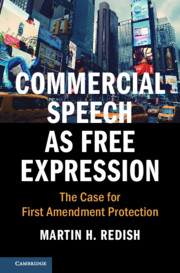
- Publisher:
- Cambridge University Press
- Online publication date:
- May 2021
- Print publication year:
- 2021
- Online ISBN:
- 9781108277563
12th August 2024: digital purchasing is currently unavailable on Cambridge Core. Due to recent technical disruption affecting our publishing operation, we are experiencing some delays to publication. We are working hard to restore services as soon as possible and apologise for the inconvenience. For further updates please visit our website: https://www.cambridge.org/news-and-insights/technical-incident


For many years, commercial speech was summarily excluded from First Amendment protection, without reason or logic. Starting in the mid-1970s, the Supreme Court began to extend protection but it remained strictly limited. In recent years, that protection has expanded, but both Court and scholars have refused to consider treating commercial speech as the First Amendment equivalent of traditionally protected expressive categories such as political speech or literature. Commercial Speech as Free Expression stands as the boldest statement yet for extending full First Amendment protection to commercial speech by proposing a new, four-part synthesis of different perspectives on the manner in which free expression fosters and protects expressive values. This book explains the complexities and subtleties of how the equivalency principle would function in real-life situations. The key is to recognize that as a matter of First Amendment value, commercial speech deserves treatment equivalent to that received by traditionally protected speech.
 Loading metrics...
Loading metrics...
* Views captured on Cambridge Core between #date#. This data will be updated every 24 hours.
Usage data cannot currently be displayed.